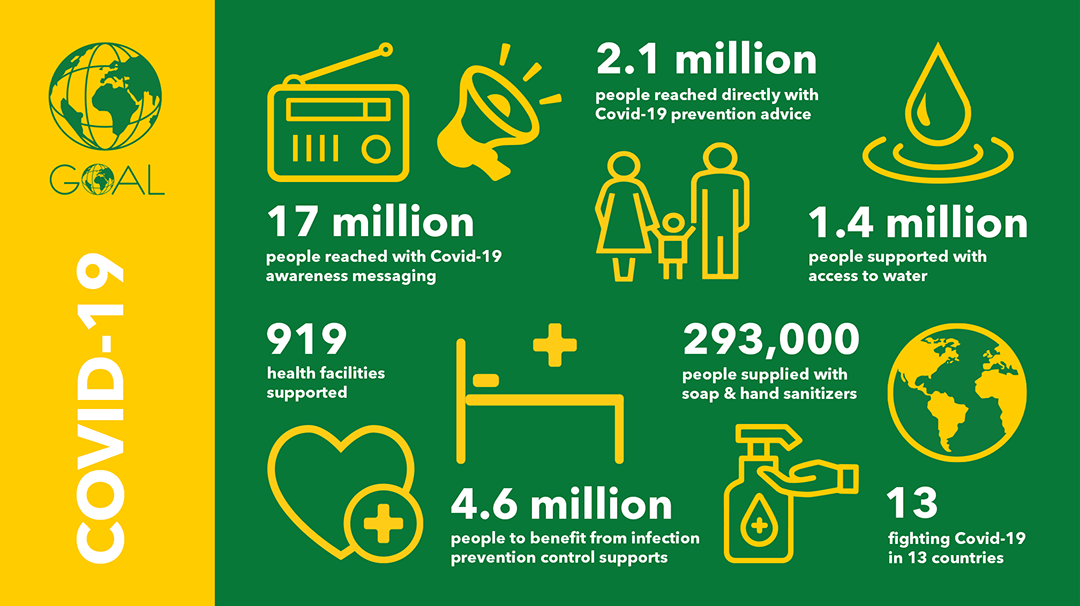 Stories
Stories
September 17, 2020 • 2 min read
GOAL has reached more than seventeen million vulnerable people with vital COVID-19 awareness messaging and supports across its 13 countries of operation since the start of the crisis in March.
The agency said the vast majority of the 17 million people have been reached with mass media campaigns including radio, Whatsapp and mobile advertising. But more than 2.1 million people have benefitted from direct contact.
The largest share of GOAL’s COVID-19 media messaging reach has been in Zimbabwe where 4.5 million have been educated on social distancing, hand washing and the importance of wearing masks through radio ads. The Zimbabwean broadcast campaign was supported with funds from Irish Aid. Meanwhile four million were reached with media messaging in Sierra Leone, three million in Malawi and 2.3 million in Ethiopia with the rest being reached across other countries.
In addition:
-
1.4 million people have been supported with access to safe water including approximately nine hundred thousand in Syria.
-
293,000 people have been supplied with soap and other hygiene items. 117,000 of these were in Zimbabwe.
-
GOAL has worked with 919 health facilities to increase capacity, primarily in Sierra Leone (436) and Ethiopia (300).
-
900 health facilities serving 4.6 million people have been supported with improving infection control.
Central to GOAL’s COVID-19 response is the Community-Led Action approach which the agency created during its response to the Ebola outbreak in Sierra Leone, Guinea and Liberia in 2014. This approach involves empowering communities to develop plans at local level to isolate and shield those most at risk, and to manage cases of infection.
GOAL Deputy CEO and Head of GOAL’s COVID-19 Task Force, Mary Van Lieshout, said the challenges that GOAL countries face from COVID-19 are many including weak or non-existent healthcare systems with very limited testing kits, ventilators, ICU beds and medical staff. For example Sierra Leone has only 18 ventilators for a population of 7.7 million. Another challenge is that restrictions of movement is impacting on people’s ability to earn money, meaning there isn’t enough in households for food and basic living items.
Preventing the rapid spread of COVID-19 in internally displaced and refugee camps is also a major concern, said Ms Van Lieshout. GOAL has been providing COVID-19 support in camps in Syria, Iraq, Turkey and Ethiopia.
“We were particularly concerned when the virus was detected in Idlib in war-torn Northern Syria where GOAL is supporting over 1.1 million internally displaced people in a very small area. We must ensure that all COVID-19 measures are demonstrably sensitive to the conflict and ensure that those most at risk of violence are protected in this difficult time. Thankfully the virus has not become widespread in this region due to quick action by our partners on the ground.”
Of further concern is the secondary impact of COVID-19 in vulnerable countries including hunger and economic devastation. The United Nations Food and Agriculture Organization has warned that COVID-19 leaves some of the world’s most vulnerable communities facing a “crisis within a crisis.”

